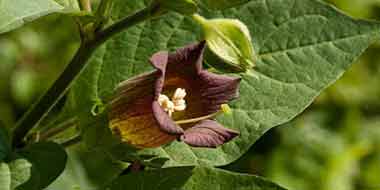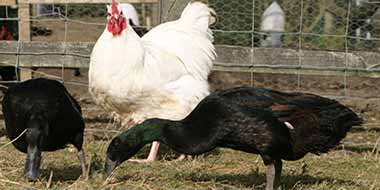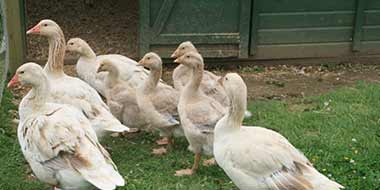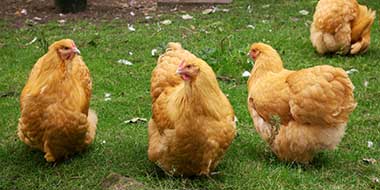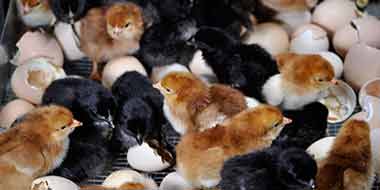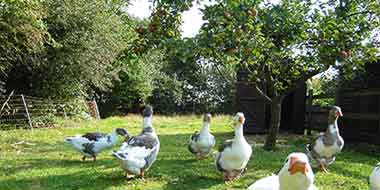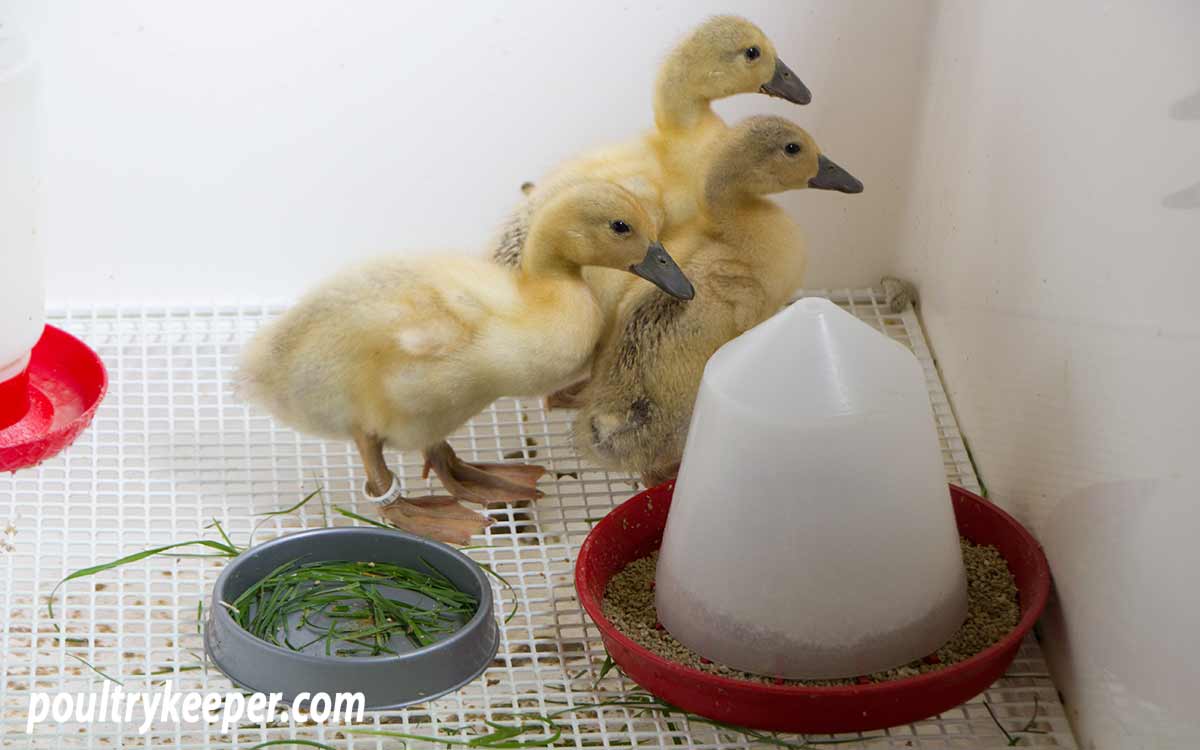
This guide is about feeding ducklings, hatched at home in an incubator or under a broody hen. If you arrived here looking for information about feeding wild ducklings, please see How to Care For Wild Baby Ducks.
Before discussing what to feed ducklings, we need to take a step backwards to the day before a duckling hatches. The last thing a duckling does before hatching is to absorb the yolk sac from the egg. It is nature’s way of feeding ducklings to give them the strength to emerge from the shell and survive long enough for the other ducklings in the nest to hatch before the mother duck can take her brood off the nest to feed.
We have learned from Mother Nature that when we hatch ducklings using an incubator, they will not usually eat or drink for the first 24 to 36 hours, so there is no hurry to move them into the brooder. It can be detrimental to open the incubator’s lid during the hatch because it reduces the high humidity we need for our hatch when open.
Feeding ducklings
What to feed ducklings from day-old to 3 weeks
From day-old to three weeks, ducklings should be fed waterfowl starter crumbs or unmedicated chick crumbs. It is crucial to check that the chick starter crumb is unmedicated – some chick crumbs contain drugs to prevent coccidiosis. Ducklings will eat more than chicks, so overdose and get sick quite quickly. The first signs are usually ducklings going off their feet. Unless it’s rectified soon, they will usually die.
I use unmedicated Fancy Feeds Chick Crumbs, but whatever brand you choose, a quick check of the ingredients will usually highlight a medicated feed. Look for words such as “Coccidiostats” “ACS”
(Anti-Coccidiostats) or “Medicated” on the label.
Provide starter crumbs in a feeder on the floor of the brooder, the day they hatch. Don’t worry if they don’t show much interest at first; you probably won’t notice them feeding until the second day.
Ducklings can be allowed to eat as much as they want, so keep feeders topped up and allow free access. You only need starter crumbs for 3-4 weeks, so a 5Kg bag will usually be big enough to feed 10-15 ducklings.
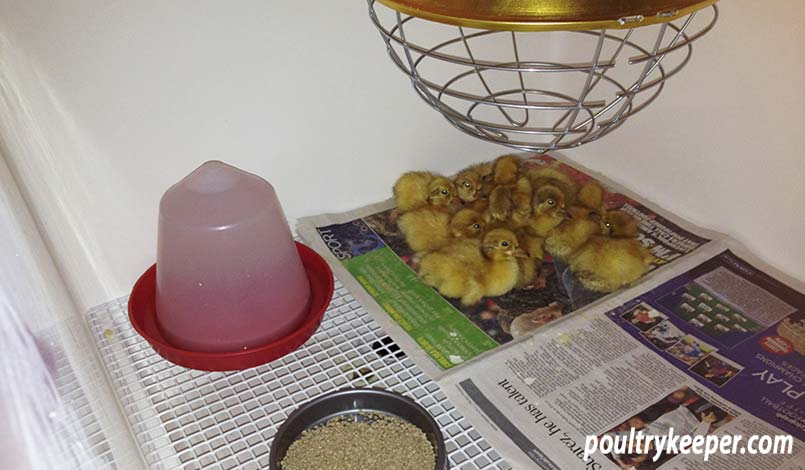
We should not keep ducklings on starter crumbs for long; they are too high in protein. At 3 weeks old (4 weeks for Call Ducks to handle the pellet size), start to wean them off crumbs, and gradually mix in waterfowl growers pellets over a week.
Again, if these aren’t available locally, you can use grower pellets formulated for chicks, but as with chick crumbs, you need to ensure they aren’t medicated.
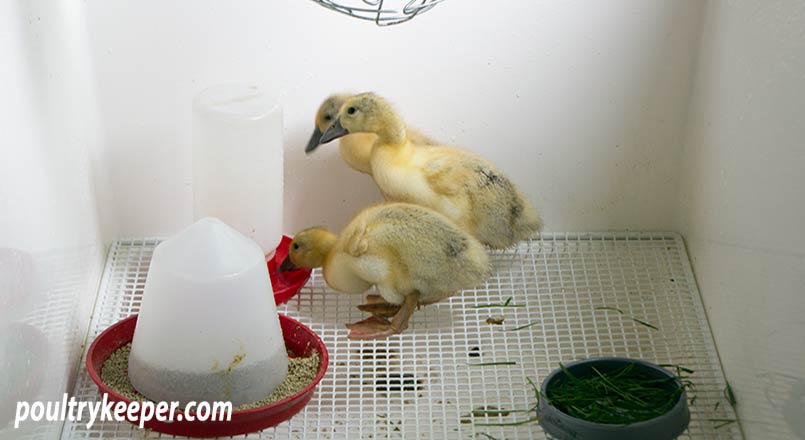
What to feed ducklings in an emergency
If you run out of starter crumbs for some reason, you can feed hard-boiled, mashed eggs to ducklings. Although it’s only suitable as a temporary/emergency feed, they should do well on this diet. The egg yolk contains the most nutrients, so it is better to provide more egg yolk than the white if they are young or weak.
Feeding young ducks
What to feed baby ducks from 4 to 16 weeks
What to feed baby ducks at four weeks old? Well, your ducklings will now be eating growers pellets, but you can also provide chopped greens, dandelions and grass cuttings at this age.
To digest these, they also need chick grit. Flit or insoluble grit comes in different sizes, and for it to be suitable for baby ducks, you need to make sure it is the smaller “chick grit”. They can have standard-size poultry grit when they reach sixteen weeks old, except for bantam sized ducks which can stay on chick grit because of their smaller size.
If the weather permits, we can move ducklings outside once they are five or six weeks old, where they can select their greens and will be able to soak up the sunlight, essential for growth and healthy bones. Remember they must be protected from rats and other predators and have a draught free house.
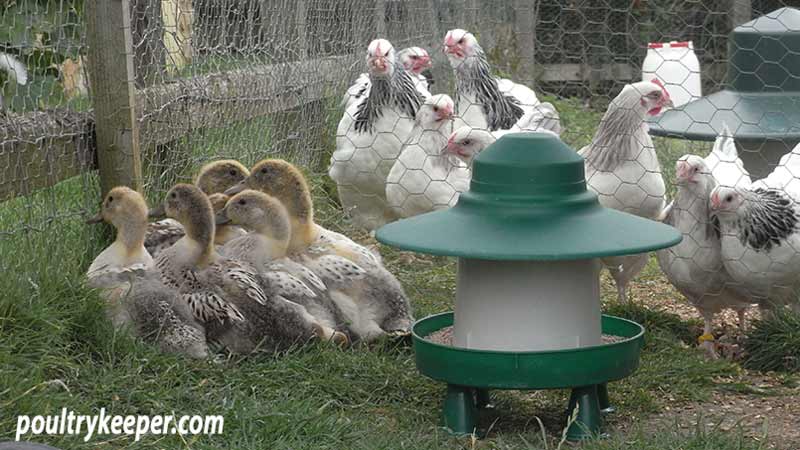
If their run isn’t covered, keep them in on wet days, so they don’t get wet and ensure their bedding stays dry.
Related Articles:
You might also find these articles useful:
- Raising Ducklings: A Complete Guide - Help with brooding ducklings
- Beginners Guide to Keeping Ducks - Everything you need to know about keeping (adult) ducks.
- Keeping Ducks and Geese - My review of one of my favourite books about keeping ducks and geese.
- Can you keep chickens and ducks together - A very common question!
Feeding ducklings is relatively straight-forward, providing you use a formulated complete feed and avoid medicated feeds. Before you know it, the weeks will pass, and your ducks will be adults when they can eat layers pellets.
Good luck and as always, please feel free to leave me a comment below, especially if you have other ideas on what to feed ducklings.


